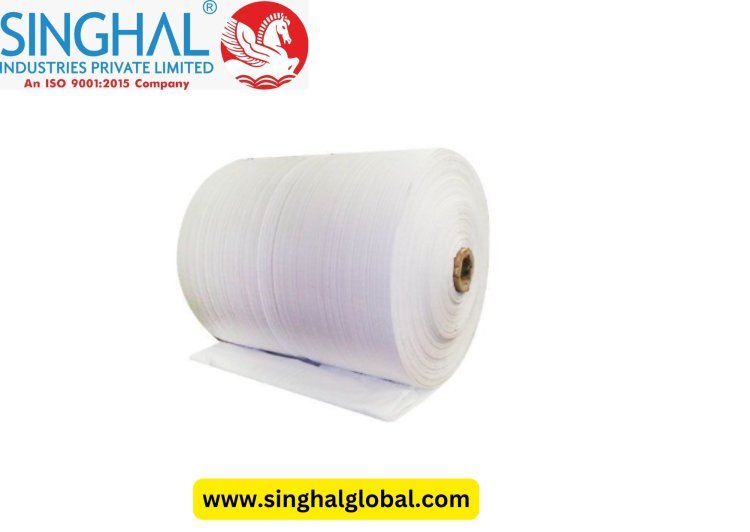The Versatility and Benefits of Polypropylene Woven Fabrics

In today’s ever-evolving industrial landscape, the demand for strong, lightweight, and durable materials is at an all-time high. Among these materials, polypropylene woven fabrics have gained considerable attention for their versatility and applications across various industries. These fabrics, made from polypropylene, offer numerous advantages, making them a preferred choice in sectors like agriculture, packaging, construction, and textiles. Understanding the role of PP woven fabric manufacturer in India and their contributions to this growing market is essential for businesses looking to harness the benefits of polypropylene woven fabrics.
What are Polypropylene Woven Fabrics?
Polypropylene woven fabrics are constructed from woven polypropylene fibers, making them strong and resistant to tearing. The weaving process involves interlacing multiple strands of polypropylene to create a sturdy fabric that can withstand significant stress and wear. This fabric is available in various weights and thicknesses, catering to different applications and requirements.
One of the most notable features of polypropylene woven fabrics is their resistance to moisture and chemicals, which makes them suitable for outdoor applications, agricultural use, and even industrial environments. Additionally, these fabrics can be UV stabilized to enhance their durability under sunlight, making them ideal for use in packaging, tarpaulins, and agricultural covers.
The Role of PP Woven Fabric Manufacturers in India
The PP woven fabric manufacturers in India play a crucial role in producing high-quality polypropylene fabrics that meet both domestic and international standards. With the rising demand for eco-friendly and durable materials, these manufacturers are constantly innovating to improve their production processes and product offerings.
In India, the textile industry is one of the largest and most diversified sectors, and polypropylene woven fabrics are becoming increasingly popular. Manufacturers are adopting advanced technology and sustainable practices to ensure they produce fabrics that are not only durable but also environmentally friendly. By utilizing recycled polypropylene and implementing energy-efficient manufacturing processes, these manufacturers contribute to reducing the carbon footprint of the textile industry.
When choosing a PP woven fabric manufacturer, businesses should consider several factors, including production capacity, quality assurance processes, and commitment to sustainability. A reputable manufacturer will adhere to strict quality control measures, ensuring that their fabrics are free from defects and meet the required specifications for various applications.
Applications of Polypropylene Woven Fabrics
The versatility of polypropylene woven fabrics extends to numerous industries. Below are some common applications:
-
Agriculture: Polypropylene woven fabrics are extensively used in agriculture for creating bags to store grains, seeds, and fertilizers. Their moisture resistance helps preserve the quality of stored products. Additionally, they are used for shade nets and ground covers to protect crops from harsh weather conditions.
-
Packaging: The packaging industry benefits from the strength and lightweight nature of polypropylene woven fabrics. These fabrics are often used to manufacture bags for transporting bulk materials, such as sand, cement, and animal feed. Their durability ensures that the contents remain secure during transportation.
-
Construction: In construction, polypropylene woven fabrics are utilized for erosion control and as geotextiles. Their ability to filter water while providing stability makes them ideal for soil reinforcement and drainage applications.
-
Textiles: The textile sector also employs polypropylene woven fabrics for making items such as shopping bags, tarpaulins, and outdoor furniture. Their lightweight yet robust nature makes them suitable for various consumer products.
Benefits of Polypropylene Woven Fabrics
The growing popularity of Polypropylene woven fabrics can be attributed to their numerous benefits:
-
Durability: These fabrics are highly resistant to wear and tear, making them suitable for demanding applications.
-
Water Resistance: Polypropylene woven fabrics do not absorb moisture, which helps in preventing mold and mildew growth.
-
Lightweight: Compared to traditional fabrics, polypropylene woven fabrics are lighter, which reduces transportation costs and makes them easier to handle.
-
Cost-Effective: These fabrics are generally more affordable than other textile options, offering a cost-effective solution for businesses.
-
Eco-Friendly: With the option of using recycled polypropylene, manufacturers can produce environmentally friendly fabrics that align with sustainable practices.
Conclusion
As industries seek durable and sustainable materials, polypropylene woven fabrics have emerged as a viable solution. The expertise of PP woven fabric manufacturers in India ensures that businesses have access to high-quality products that meet their specific needs. With their versatility and myriad applications, polypropylene woven fabrics are poised to play an increasingly important role in various sectors.
Here are Related Forpp woven fabric manufacturers in india
1. What are the advantages of using polypropylene woven fabrics?
Polypropylene woven fabrics offer durability, water resistance, lightweight characteristics, and cost-effectiveness. They are also eco-friendly, as they can be made from recycled polypropylene.
2. What industries commonly use polypropylene woven fabrics?
These fabrics are used across various industries, including agriculture for storing grains, packaging for bulk materials, construction for erosion control, and textiles for consumer products like shopping bags.
3. How do I choose a reliable PP woven fabric manufacturer?
When selecting a PP woven fabric manufacturer, consider their production capacity, quality assurance processes, sustainability practices, and reputation in the industry. A reliable manufacturer will consistently deliver high-quality fabrics that meet your specific requirements.
What's Your Reaction?
















